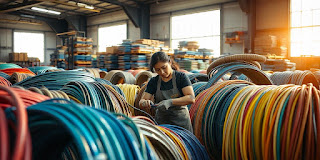Why HDPE Pipes Are Revolutionizing Agriculture and Irrigation Systems
In the ever-evolving world of agriculture, efficient water management is the backbone of sustainable farming. As farmers face challenges like water scarcity, erratic rainfall, and rising costs, innovative solutions are critical. Enter HDPE pipes—a game-changer in irrigation and agricultural systems. Known for their durability, flexibility, and cost-effectiveness, these pipes are transforming how water is delivered to crops. At Sudhakar Group, a leader among HDPE pipe manufacturers, we’ve witnessed firsthand how HDPE pipe technology is revolutionizing farming practices. In this blog, we’ll explore why HDPE pipes are the future of agriculture and irrigation.
The Need for Modern Irrigation Solutions
Agriculture consumes about 70% of the world’s freshwater, yet traditional irrigation methods like open canals and metal pipes often lead to significant water loss through leaks, evaporation, or corrosion. In India, where agriculture supports millions of livelihoods, optimizing water use is non-negotiable. Farmers need systems that deliver water efficiently, withstand harsh environmental conditions, and reduce maintenance costs. HDPE pipes meet these demands, offering a reliable alternative to outdated materials like metal, PVC, or concrete.
What Makes HDPE Pipes Stand Out?
High-Density Polyethylene (HDPE) pipes are made from a strong, lightweight thermoplastic known for its resilience and versatility. Unlike traditional materials, HDPE pipes are corrosion-resistant, flexible, and capable of enduring extreme weather, making them ideal for agricultural applications. Their smooth inner surface minimizes friction, ensuring consistent water flow and reducing energy costs for pumping. These qualities, combined with their long lifespan, make HDPE pipes a preferred choice for modern irrigation systems like drip and sprinkler setups.
Key Benefits of HDPE Pipes in Agriculture
- Durability and Longevity
HDPE pipes are built to last, with a lifespan of 50–100 years under proper conditions. Unlike metal pipes that rust or concrete pipes that crack, HDPE resists corrosion, UV radiation, and chemical exposure from fertilizers or soil. This durability translates to lower replacement and maintenance costs, allowing farmers to focus resources on crop production. Sudhakar Group’s HDPE pipes are engineered to withstand India’s diverse climates, from scorching summers to heavy monsoons, ensuring reliable performance year after year. - Water Efficiency and Conservation
Water scarcity is a pressing issue for farmers, particularly in drought-prone regions. HDPE pipes excel in water-tightness, with leak-proof joints that prevent wastage—a stark contrast to open canals or aging pipelines. Their flexibility allows for seamless integration into drip irrigation systems, which deliver water directly to plant roots, minimizing evaporation and runoff. By optimizing water use, HDPE pipes help farmers achieve higher yields with less water, supporting sustainable agriculture. - Ease of Installation and Cost Savings
HDPE pipes are lightweight and flexible, making them easier and faster to install than heavier alternatives like metal or concrete. This reduces labor costs and installation time, a significant advantage for large-scale farms. Additionally, their low maintenance needs and resistance to damage mean fewer repairs over time. While the initial cost of HDPE pipes may be comparable to other materials, their long-term savings make them a cost-effective investment for farmers. - Environmental Sustainability
Sustainability is at the heart of modern agriculture, and HDPE pipes align perfectly with this goal. They are recyclable, reducing their environmental footprint compared to non-recyclable materials. Their energy-efficient water delivery also lowers the carbon emissions associated with pumping. By choosing HDPE pipes, farmers contribute to eco-friendly practices while boosting productivity. - Versatility Across Applications
HDPE pipes aren’t limited to irrigation. They’re used in water supply lines, drainage systems, and even biogas distribution on farms. Their ability to handle varying pressures and adapt to different terrains—hilly fields, rocky soils, or flat plains—makes them a versatile solution for diverse agricultural needs. Whether you’re setting up a micro-irrigation system or transporting water across vast fields, HDPE pipes deliver consistent performance.
How HDPE Pipes Are Transforming Farming
The adoption of HDPE pipes is driving a shift toward precision agriculture. Drip and sprinkler systems powered by HDPE pipe allow farmers to control water and nutrient delivery with pinpoint accuracy, improving crop health and reducing waste. In regions with unreliable rainfall, these systems ensure consistent water supply, enabling year-round farming. For smallholder farmers, the affordability and scalability of HDPE-based irrigation make advanced techniques accessible, leveling the playing field.
Sudhakar Group has been at the forefront of this transformation, providing high-quality HDPE pipes tailored to the needs of Indian farmers. Their products are designed to meet stringent standards, ensuring reliability even in challenging conditions. By partnering with trusted manufacturers like Sudhakar Group, farmers can access cutting-edge solutions that enhance productivity and sustainability.
Final Thoughts
HDPE pipes are more than just a piping solution—they’re a catalyst for modernizing agriculture and irrigation. With their unmatched durability, water efficiency, and versatility, they empower farmers to overcome environmental challenges and boost yields. As water resources dwindle and farming demands grow, HDPE pipes offer a path to sustainable, profitable agriculture. By choosing Sudhakar Group’s expertly crafted HDPE pipes, farmers can invest in a future where every drop counts, and every crop thrives. Embrace this revolution and watch your farm flourish like never before.


Comments
Post a Comment